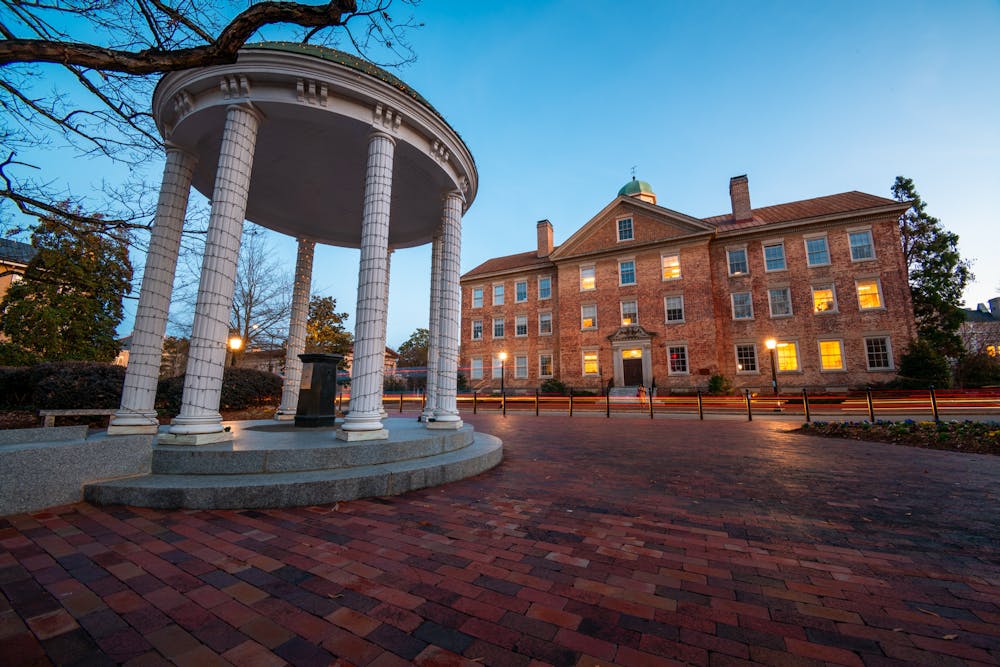The UNC Faculty Council met on Friday for its first convening of 2024. The council debated a resolution condemning statements made during an event on campus and proposed amendments to the Faculty Code.
Interim Chancellor Lee Roberts also attended the meeting to present the Thomas Jefferson Award and answer questions from faculty members.
Here’s the rundown:
What's new?
- The 2023 Thomas Jefferson Award was presented to Michael Gerhardt, Burton Craige Distinguished Professor of Jurisprudence, for exemplifying “the ideals of democracy, freedom and education,” Roberts said.
- Gerhardt’s accomplishments include the Financial Times Books of the Year award for his 2013 book “The Forgotten Presidents” and his role as the principal consultant to the Library of Congress for coordinating revisions to the U.S. Constitution.
- Roberts noted three takeaways from his first week leading UNC.
- Roberts said he saw enthusiasm, energy and a “palpable love” for the University across campus. He also said there should be increased awareness across the state and country about the level of expertise and research at UNC. Roberts said he hopes to help the institution be more efficient, citing difficulties in hiring, traveling and applying for grants.
- Additionally, the interim chancellor answered questions from members of the Faculty Council.
- Kenan-Flagler Business School professor Mark McNeilly asked Roberts about the pending investigation into University response to a complaint of antisemitism. Roberts said he visited representatives of the Jewish and Israeli communities, including UNC Hillel, the Israeli Consulate General and others.
- Roberts discussed the challenges of gray areas in free speech on campus. He said some speech can be considered harassment if it is targeted at individuals.
- “We are bound both as a matter of law and in our role as a University by the First Amendment,” Roberts said. “And we should have a robust and free-flowing dialogue about the events in the Middle East as well as any other kind of world event. But, there are rules. You can't threaten, or intimidate or harass your classmates.”
- Public policy professor Douglas Lauen expressed concerns about a recording of a professor’s comments during a class that was cited in the antisemitism complaint. “I’d like to know more about how those recordings were used and whether that was ethical or not,” Lauen said. Roberts deferred the question to provost Christopher Clemens.
- “While we cannot comment on individual cases, the University did not make any recording or authorize a recording, nor did we distribute a recording,” Clemens said. He encouraged faculty members to refer to the University’s policy for best practices on recordings of class sessions.
- Statistics professor Jan Hannig asked Roberts if he viewed his role as strictly that of an interim chancellor, or if he is planning to apply for the permanent position. “No one’s promised me anything other than the opportunity to work hard as interim chancellor,” Roberts said.
- Council members discussed a resolution to condemn comments made by a guest speaker at a roundtable discussion held on Nov. 28 by the UNC Department of Geography and Environment and the UNC Center for Middle East and Islamic Studies — an event also cited in the antisemitism complaint. The resolution was submitted by applied physical sciences professor Ronit Freeman.
- Hannig moved to postpone the resolution indefinitely. He cited concerns that the resolution's content is already covered by the University’s policy against discrimination, and that former Chancellor Kevin Guskiewicz, the department that hosted the event and the dean of the College of Arts and Sciences had already condemned the speaker’s comments.
- School of Medicine professor Cheryl Jackson said that to adequately vote on the issue, the entire roundtable discussion would have to be reviewed, in addition to the statement cited in the resolution.
- Linguistics professor Misha Becker said that not everyone may share the same understanding of the term antisemitism.
- “I understand it as hatred of Jews, violence towards Jews, but I think it's also being used a lot now about the state of Israel, in addition to Jewish people,” Becker said.
- McNeilly said the resolution was a “necessary, if insufficient, step.”
- School of Nursing professor Eric Hodges said he was concerned that if the council were to pass the resolution, it would be obligated to pass resolutions on “all future events.”
- The motion to postpone the resolution indefinitely was taken to vote and passed with 32 in favor, 29 opposed and six abstaining votes.
- The committee presented three resolutions to the Faculty Code, all of which passed.
- The first two resolutions proposed increasing membership of the Faculty Hearings Committee and the Committee on Honorary Degrees and Special Awards.
- The third resolution changed the minimum number of members required at a meeting to include members of the Faculty Executive Committee and the Faculty Assembly Delegation, previously considered ex-officio members.
What’s next?
The Faculty Council will meet again on Feb. 23.




